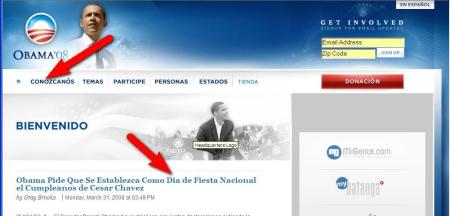On Friday, April 11, MySpace oficially launched MySpace Latino, the Spanish-language U.S Hispanic version of the social networking site. Unfortunately, MySpace didn’t get it right: they did a poor job on the translation/adaptation process of their site into Spanish.
According to the company’s news release, the site was created as a way of:
“responding to the needs of our growing Hispanic membership, MySpace Latino offers content that is culturally relevant to Latinos in the U.S.,”said VP and Managing Director of MySpace Latino, Victor Kong.
I highlighted culturally relevant because after visiting the site, I was shocked (in a bad way). The site’s copy contains many grammatical mistakes as well as the usage of words that are not common, or even understandable by their target audience. If MySpace’s goal is to target an ever-expanding Spanish-speaking audience, then the site ought to be more respectful of them. This blunder could illustrate a lack of knowledge of – or interest in – those whom MySpace is trying to reach, or, even worse, a sign of disrespect to Spanish speakers.
The home page shows the word Entérate without an orthographic accent over the second ‘e’; in most Latin American countries this a significant grammar mistake. The only exception is Argentina, where the word is pronounced with an emphasis on the second-to-last syllable. According to the U.S. Census Bureau, the total number of Argentians living in the U.S. is of around 175,000, or 0.4% of the total U.S Hispanic population. This means that MySpace’s usage of the word Entérate without an orthographic accent is wrong to 99.6% of the site’s target audience. (For a broader explanation of Spanish-language orthographic accents click here.)

Also, after signing up, I received a confirmation e-mail containing the following phrase:
Esperamos que te lo pases pipa explorando el sitio. ¿Ya te has paseado por estas zonas?
The expression “que te lo pases pipa” (to have a good time) is also a regional Argentinian phrase. For Hispanics from Mexican origin, who represent 64.1% of the population, these words mean nothing.
The following problems were also found on the home page of MySpace Latino: a) The word video is used with and without an orthographic accent (both forms are correct, but the spelling of the word should be consistent throughout the same document – though I must say that for most Latin American countries, the word video without an orthographic accent is preferred); and b) the word Inscríbete appears in the sign-in menu without an orthographic accent when it ought to have one.

Spelling and punctuation mistakes were rampant throughout the Web site. For example, one page had the word “ciudad” mispelled as “cuidad,” and on another, the word “que” did not have an orthographic accent when it should have had one. Also, a phrase that ended with an exclamation mark (!) did not have a corresponding opening mark (¡) – a bad punctuation mistake.

Such punctuation mistakes might be minor when drafting the Web site’s copy. The problem comes when these mistakes were not caught in the review process. My Space Latino’s PR firm, Edelman ( Multicultural practice group), should have caught these errors before letting their client “go live” without carefully reviewing the site. Call me a purist, but grammatical mistakes are unacceptable in a project like this because they hint at a carelessness that can be equated with lack of respect for the target audience. After all, do you think that repeated grammar mistakes in the English-language version of MySpace would be tolerated? I don’t think so.
If it truly is MySpace Latino, then it should speak my language.



 Posted by nmarketing
Posted by nmarketing 








